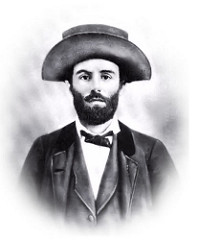July, Tuesday 24th, 1861.
At the Battle-ground near Bull Bun.
Dear Sisters:
We have had so many small marches and large fights lately that I have had no time to write, and because we left everything but blankets and provisions when we set out to meet the enemy last week–paper among the rest–I borrow this, and am fortunate in doing so. Last Tuesday, the 18th, we, the 7th regiment, hurried up to the aid of the 1st Virginia and some other regiments who were defending Blackford’s Ford, on Bull’s Creek. We went in under a heavy fire of musketry, but we were in some measure protected by trees and the overshooting of the enemy. Colonel Hays considered the fire there very heavy. On Sunday the enemy attacked the whole line guarded by our troops, but at this point, Stony Bridge, the main battle was fought. Our regiment was entrenched where the first battle was fought that morning at the Ford, but gave up the situation to some others, and we were held as a reserve. We were kept marching around, with an occasional bombshot falling about us and taking off a few of our regiment, for I suppose about five hours; then we came here too fast by a long deal for comfort, and arrived almost exhausted, but still, from all accounts, our approach decided the affair, and we were not in the fire of the enemy more than ten minutes or a quarter of an hour before they retired. I cannot give particulars; you will get them from the papers, and I wish you would send brother and sister an account of same.
I have heard many a ball sing its death-note since I saw you, but am as well as ever I was, and honorably so, too. The day after the battle I was in search of water, and strayed over the battlefield; it was wet and foggy, and it did not take me as long to get lost as it did to find my way back to camp again. One of my messmates went to the Colonel and told him that I was long gone, whereupon the Colonel paid me the compliment to be uneasy and to say he would willingly send the whole regiment to my rescue if the enemy had me, adding, that the first day he saw me he knew that I was to be depended upon. I had given the Colonel a cup of coffee that morning; there was almost none in camp, and perhaps that attention and my coming from West Texas helped me to get the compliment. I tell the anecdote to you, knowing that it will please you, as it did me.
Direct to the same place to be forwarded. I have not drawn the money yet. Some of the company fell back, but your brother was not among the number.
Claude.
My position here is much to my satisfaction; the snobs are becoming modest. Colonel Hays’ saying he would turn out the regiment for me was of course only a compliment, but I think he likes me. I would not be anywhere else for anything. Write to Texas for me; our things have not come up yet, so I can not write for myself.
__________
About ten days after this last letter was written Claude LeGrand was shot in the right arm, near the shoulder, at the battle of Port Republic, in the Shenandoah Valley. “After he was wounded, without paying any attention to his own hurt,” writes his niece, Mrs. Weeden, “he assisted in putting others of the wounded into wagons. In helping lift a heavy man his superior officer reproached him for seeming lack of energy. LeGrand replied that he was doing the best he could, as he could not use his right arm. On examination the officer was overcome with sympathy, and told him that he should have been one of the first to receive attention and assisted LeGrand into the wagon himself. He was then jolted over a rough road to Charlottesville, with only straw for a bed and but a bucket of water by his side as dressing for the cruel wound. There he lay in a barn for three days without attention, with the result his arm had to be amputated at the shoulder. He gave great promise as a sculptor, and it can easily be seen what the loss of his right arm meant to him.” Fortunately, there was nursing at the Charlottesville hospitals at this time a friend of Claude LeGrand’s sister, Mrs. Johnston. This was Miss Emily Virginia Mason. She at length discovered young LeGrand among the crowd of wounded men, and nursed him carefully, sending tidings of him to the distracted brother and sisters, who had been for a long time without news of him.
__________
p. 26 — 29, Journal of Julia LeGrand, who at this point is in New Orleans, the journal to be started in December, 1861.
